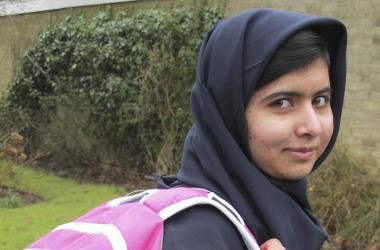Malala Is Not Alone: Other Brave Pakistanis Risk Lives For Female Education, Speak Out At 'Women In The World 2013'

When Malala Yousafzai was shot in the head by the Pakistani Taliban at the age of 15, the brutality of the attack shocked the world. The teenager, who had been a champion of girls’ education in one of the world’s most hostile environments, suddenly became a global icon, and her name a rallying call for human-rights activists everywhere.
Malala is in the U.K. recovering, slowly but surely, from the bullet that struck her in the head six months ago. But her story is far from over.
In Pakistan, violence against women who challenge social norms is still rampant. Last year, 913 women and girls were victims of so-called honor killings, according to the Human Rights Commission of Pakistan’s “State of Human Rights in 2012” report. Honor killings are committed by men -- typically family members -- who feel they must respond to the perceived sins of their female relatives by murdering them, thereby restoring honor to the family name.
Of the 913 killed, 604 had been accused of having immoral relationships with men, and 191 were targeted because they married for love. In 71 cases, the victims were murdered by their own fathers. Another 209 were killed by their husbands. Dozens were raped before they died. At least 99 of the females slain were minors.
But some women and girls in Pakistan have something else in common with Malala, not her victimization, but her courage.
Three of those young women -- Humaira Bachal, Khalida Brohi and Sharmeen Obaid-Chinoy -- brought their stories to New York on Thursday evening at the Women in the World Conference, an annual gathering of movers and shakers whose work has promoted gender equality around the world.
There were plenty of luminaries presenting that night, including Tina Brown, Meryl Streep, Barbara Walters and Angelina Jolie. But the three Pakistani women, who shared the stage with CNN journalist Christiane Amanpour, were the only ones to get a standing ovation.
Obaid-Chinoy, 34, is a Pakistani-Canadian journalist and documentarian whose work has taken her all around the world, and whose video productions -- including five films about Pakistan -- have won Emmys and Oscars.
It’s tough work, but Obaid-Chinoy said that being a female sometimes helps her to gain access in restrictive environments.
“There is a certain level of respect people have because I am a woman,” Obaid-Chinoy said. “When they see a woman who looks them in the eye, sometimes they don't know how to look at me.”
Bachal, 25, and Brohi, 24, can relate. Both young women have sought out male villagers and tribal elders to spread their message of gender equity. It is something they must do to further their cause, even though many of these men say -- quite openly, even laughingly -- that women who seek independence ought to be killed.
But both girls know that getting men on their team is the only way to make long-term progress. And, in any case, spreading awareness is only one part of the work they do every day.
Bachal works to promote education in a rundown neighborhood of Karachi, the commercial hub where she grew up. She started out by teaching other children in her home when she was only a teenager and eventually founded the Dream Foundation Trust, which organizes classes, summer activities and other events for students in the community.
Bachal now runs the Dream Model Street School, which educates hundreds of children and adults in a rented facility.
Brohi also gained an education in Karachi, although she came from one of the nearby small villages in the province of Balochistan. Tragedy inspired her to work for change -- her best friend became the victim of an honor killing several years ago when she tried to marry someone her family had not approved.
Today, Brohi organizes what she calls Sughar Centers -- “sughar” is a word that means confidence -- where women are trained to design and create handbags, clothes and other goods that are sold all around the world to help women provide for themselves, and to raise money for promoting gender equality.
It has not been easy for Brohi to pursue this work -- she meets with plenty of resistance. Even her own parents needed some convincing.
“Things have been very risky for us; it’s not their fault that my parents fear,” Brohi said on Thursday. “But before coming here, I had a big talk with my dad. I told him that not doing this work would kill me; doing this work would keep me alive. Let me go. And he said yes.”
After Obaid-Chinoy, Bachal and Brohi left the stage on Thursday evening, Jolie introduced the next speaker. It was Malala herself, whose face appeared onscreen for a video address.
“Today I’m going to announce the happiest moment of my life. This is the first grant of the Malala Fund,” she said, referring to a new project that had just raised $45,000 with help from Jolie. “In my motherland [in the district of Swat], we are going to educate 40 girls. I invite all of you to support the Malala Fund and help us turn the education of 40 girls into 40 million girls.”
Malala has good reason to be ambitious: Her courage has already inspired countless others to follow in her footsteps. As she soldiers on with the work that has already put her in the line of fire, other young women such as Bachal and Brohi will be right there with her -- with activists the world over supporting their cause.
© Copyright IBTimes 2025. All rights reserved.






















